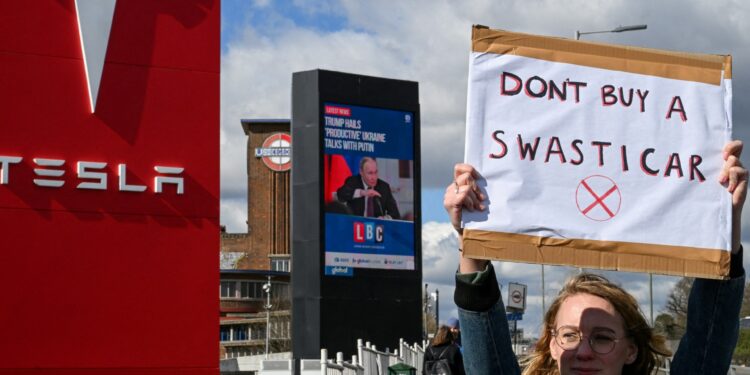US President Donald Trump’s insistence on continuing policies that expose the European economy to danger are pushing more Europeans to boycott American goods to express their strong frustration with the American administration’s dealings with the old allies, the American New York Times reported in a report.
The newspaper quoted Bo Albertos, the Danish, who runs a group of 90,000 members on Facebook calling for boycotting American products, as saying, “I had a sense of impotence, and therefore we now feel that we do something. Our actions stem from our frustration. The strongest momentum behind such consumer practices apparently focuses in countries that Trump has directly concentrated, such as Denmark that threatened By grabbing its land (Greenland) and Canada, which he said repeatedly, it should be the No. 51 of the United States.
While Trump is wooing to Russian President Vladimir Putin and imposes customs tariffs on European goods, they are spread in many old continent countries, American goods boycott groups, which exchange advice on the list of alternative local products.
In a Swedish group on Facebook, its members are 80,000, users are wondering about instructions for buying laptops, dog foods, non -American -made toothpaste products, and members of a French group praising the chaos cleansing and European smartphones, according to the newspaper.
Moreover, these pages are filled with detailed discussions on the identity of American goods and how Coca -Cola products can be classified in Britain, or ice cream (Ben and Jerez) currently owned by the British company Unilever.
This explains how to boycott the products in the World Trade era is not that simplicity, but most of these groups provide a place that brings together Europeans and other nationalities during which they exchange stories and express their opposition to American policies.
https://www.youtube.com/watch?v=cqand9qbloc
Objection
In the same context, Magkin Jinsen, 49, who works as a coordinator of a government agency in Copenhagen, admits that millions of people around the world are biting American goods and that boycotting some consumers in a limited number of countries for these products may not constitute a tremendous difference, and despite this, Jinsen stopped buying American products such as “Oreo” and “Cats ketchup” (Haynes), The American Serum (Hair Oil) “East Lauder” was replaced by the local product (Pioti Pacific).
“I am not even a drop in an environment, but this is my modest way to protest,” said Ginsen.
The violent reaction prompted some stores to implement policies that facilitate consumers to distinguish local products, for example, the major “Le Pollaau” chain in Canada put the code to refer to American -made products whose prices have increased due to the revenge fees that Canada recently imposed in response to Trump.
In Denmark, the Nitto, Becca and Photix chain added stars to the price poster for European products at the request of consumers in order to distinguish it clearer according to the statements of the parent company.
The researcher at the Atlantic Countel Center, Elizabeth Brao, believes that the social media and the interrelated global economy gives consumers a higher voice than before.
“Over the years, the United States has committed many controversial things, but I do not think it, including the Vietnam War, sparked a similar campaign, and the reason behind this is that social media was not available at the time.”
Business leaders realize the potential consequences of this. The company (Buen Mit), a California -based plant food company, has warned in its latest financial report that it may lose its customers internationally because of the “anti -American feelings”.
Retreat
Michael Middlain, CEO of “Emparir”, the second largest Canadian store chains, said that his company’s sales of American products “falls quickly” due to the increasing demand for non -American goods, and this slope is expected to continue after the company brought more products from other countries instead of the United States after the retaliatory Canadian fees have increased the cost of importing American products.
In a similar context, the Swiss chocolate company (Lindand) said earlier this month that it would start in Canada to sell chocolate made in Europe and not in the United States with the aim of avoiding new fees and reducing the risks caused by angry reactions to consumers.
https://www.youtube.com/watch?v=6AFINCFQDW
Tesla, manufacturer of electrical cars, is one of the largest affected people from boycotting American products abroad, especially after its CEO Elon Musk has become a cornerstone of the Trump administration, as well as promoting the extremist right parties in Europe via the “X” platform that he owns.
In Germany, the largest electric cars market in Europe, Tesla cars sales decreased by 76% in February compared to the same period in the previous year, according to the German Automobile Industry Association.
The boycott also strikes the digital world, as consumers canceled their subscriptions on American platforms such as “Netflix”, “Disney+” and “Amazon Prime Video” and other ones that provide digital broadcasting services despite the difficulty of finding alternatives to provide the same offers, as Bartos decided, for example, to participate in the Swedish broadcasting platform “Via Play”.
For his part, said Mads Moritzen, who founded the Danish group calling for boycotting American products on Facebook, that he deleted his accounts on the Air Ben Airbnb site to rent apartments, rooms and Hotels.com and stop using “Google” and “Microsoft”, and justified his use of Facebook, whose mother company is in California, as a platform for the group as the means The easiest to reach the largest number of people.
“It is very important to say that we still love Americans, we still love the United States, but there is a current situation that does not like us, and there is a current American administration that we do not like,” he added.



